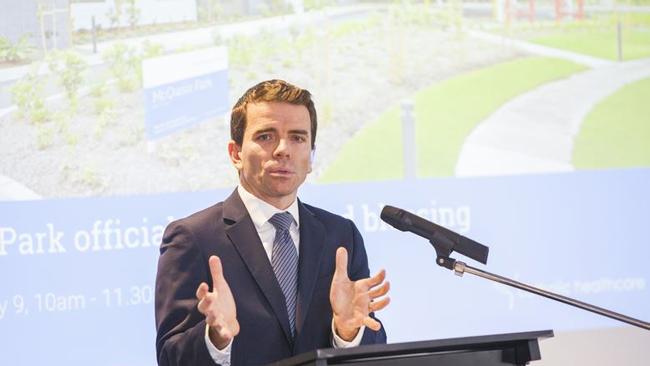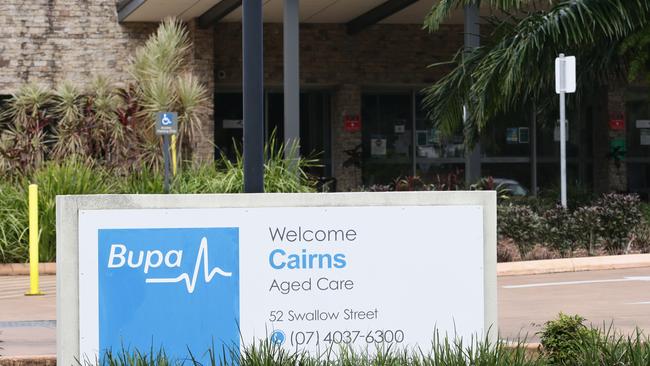Overseas nurses and retirees are part of Bupa’s solution
With a desperate need for more nurses, Bupa says changing the visa and pension systems is critical to solving the labour crisis.

One of Australia’s biggest aged care providers, Bupa, has called on the Albanese government to introduce a new visa to import more workers and change the pension system to lure older nurses from retirement to plug a chronic labour shortage.
Australia is in desperate need of nurses, with the aged care sector competing with hospitals to meet new government rules that stipulate that registered nurses be employed 24/7 across all nursing homes.
It has placed further pressure on the sector, where typically nurse wages are about 25 per cent lower than hospitals. The situation has become so dire that Bupa Villages & Aged Care managing director Andrew Kinkade said the company was turning away residents from some of its regional staff because there is not enough staff to accommodate them.
“Thousands of older Australians right now are in a base hospital, waiting for access to aged care,” Mr Kinkade said.
“The aged care is there and has room available, but doesn’t have the workforce. And so we’ve had homes and we were aware of other organisations that we work closely with in regional Australia where we’ve been declining new residents and families because we haven’t had the workforce.
“The impact is it’s placing a strain on the broader health system.”
If the aged care sector can’t access enough registered nurses to meet the new government rules - an outcome of the Aged Care Royal Commission - it will force the closure of some aged care homes. Already, Wesley Mission has closed its homes in Sylvania, Carlingford and Narrabeen over workforce constraints.
Meanwhile, the squeeze on the sector has sparked a wave of consolidation and other corporate activity to shore up its viability.
“We don‘t don’t want to be contemplating closures as a next step. We’d much rather be finding better ways to address shortcomings in the system and continuing to invest in our workforce,” Mr Kinkade said, adding that Bupa has employed registered nurses across its homes for several years.

Aged care is emerging as a significant issue for the Albanese government. The 2023 federal budget - to be released on May 9 - will reveal aged care costs to have grown to make the sector the fifth-largest area of federal government expenditure.
The costs will rise to an estimated $29.6bn from $24.8bn in 2022, a leap of 23 per cent. The increase has been attributed to Australia’s ageing population, with the number of aged care residents growing 3.5 per cent from 2020-21 to 2021-22 to reach 1.5 million.
Bupa - which cares for more than 5000 residents across 50 homes - has long advocated for the government to allow wealthier Australians to pay for a greater share of their aged care. Currently, aged-care charges are capped at $30,574.33 a year or $73,378.49 in a resident’s lifetime.
But Mr Kinkade said the government could do more to ease the nursing crisis if it follows New Zealand and Canada’s lead.
“A big opportunity for us in Australia that would have immediate impact is growing the workforce participation among 65-plus workers, so in New Zealand, you have 10 times as many pensioners working as you do in Australia. They’ve obviously made changes to their pension and tax system to encourage that.
“This is a challenge that exists in, I think, nearly every Western country. So we‘re looking around the world to see how others are grappling with it. Certainly, I’d say that the visa system is one (area that can ease the nurse shortage). If you look in other markets, such as Canada, that they’ve moved faster than then we have to open that up.
“Here there is no dedicated aged care visa - fast track visa - which the Productivity Commission recommended and we‘d like to see that.”
ASX-listed aged care provider Estia, which has a market value of $678.2m, has become a takeover target, with private equity giant Bain Capital lobbing a $775.2m proposed buyout last month.
It follows Catholic healthcare provider Calvary taking over Japara – an aged-care provider formerly listed on the ASX – for $380m two years ago. Meanwhile, BaptistCare combined its east and west coast arms earlier this month in one of the biggest aged-care mergers of the year.
But Jarden analyst Matt Johnston is upbeat on the sector, despite its challenges.
“While some uncertainties still remain for the aged care sector, it is improving and likely will result in the sector getting clear air in the near term. Shareholders could also wait for the federal budget in May to determine potential catalysts from funding outcomes,” Mr Johnston wrote in a note to investors after Bain lobbed its takeover bid for Estia.
To this end, he cautioned investors about Bain’s bid of $3 a share. He has a price target of $3.22 for Estia.
“The initial proposal from Bain Capital is welcomed by investors but we believe it undervalues the equity.
“Estia’s operational improvement combined with its above-industry average star rating likely demands a higher price would be accepted.







To join the conversation, please log in. Don't have an account? Register
Join the conversation, you are commenting as Logout